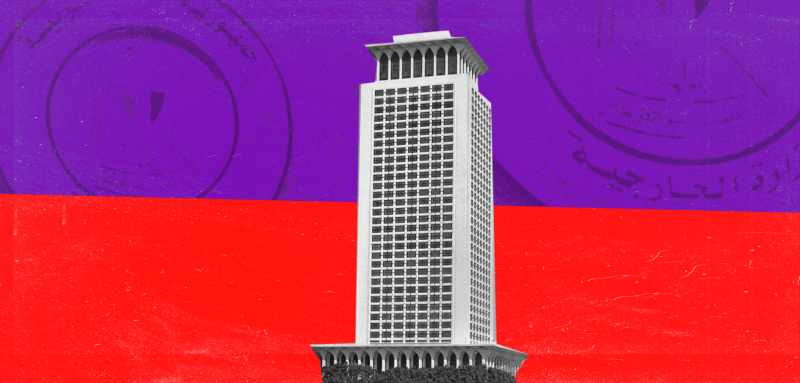The past few weeks have witnessed escalating tension in relations between Saudi Arabia and Egypt, bringing back the memory of the tension between the two countries in 2015 that lasted for many months, and only ended after the Egyptian authorities agreed to cede the islands of Tiran and Sanafir in favor of the Saudi side, and eliminated any popular attempts to obstruct the agreement. At the time, the tension took the form of a sharp media exchange between Saudi journalists, program presenters, and writers in Egyptian government newspapers, but it extended to economic blows that the Saudi side directed to the Egyptian side during that period.
This time, the dispute between the two sides appears – as usual – in the form of a media and political debate and criticisms directed by those affiliated with the two authorities of the system of government against the other country, amid official silence from the governments of Riyadh and Cairo. However this debate sometimes exceeded mere "points of view", at a time when this debate is seen as a sign of Cairo changing its cards and tools in dealing with its strategic allies, and an indication of the direction of the Egyptian diplomatic compass in terms of its influence on decision-making in the region.
While the two countries were on a semi-direct line of confrontation, relations between Egypt and other strategic partners are marred by a tug-of-war in a number of thorny files. One of the most prominent allies that the regime of President Abdel Fattah al-Sisi has always relied on is the UAE, with which the tension in relations raises questions about why the Egyptian administration seems to be so concerned about its most important regional backers, at a time when questions revolve around what tools Cairo possesses that would enable it to engage in these political maneuvers.
While Cairo relies – according to the writings of Gulf voices critical of it – on the striking force of its army to protect the security of the Gulf, this same army receives its share of the attack of Gulf writers
In the past, Egypt was a major player in foreign policy in the Middle East, thanks to its strategic strength, size, location, and security stability that ensured its political stability, which in turn enabled it to play a key role in many regional developments. But it has recently seemed to be somewhat absent from the regional arena, as a result of its economic missteps and fraught internal situation, in addition to accelerated moves by other countries to play its role in the region, and its exploitation of its rising financial and political influence with the change in regional dynamics.
Cairo – Riyadh: Fiery media exchanges and hidden messages
Writers, officials, and media outlets from both Riyadh and Cairo have launched a campaign full of harsh criticism of the other side, led by two Saudi writers close to the decision-making circles in the kingdom, Turki al-Hamad and Khalid al-Dakhil, and the advisor to the Saudi Presidency of State Security, Bassam Atiyyah. On the Egyptian side, writers and broadcasters known for their close proximity to sovereign bodies have responded to them, but the statements of those on the Saudi side have taken an unprecedented form in commenting on the situation in Egypt. They focused on how the Egyptian popular aspirations for justice and dignity after the January 25 revolution have been wasted, as well as the decline of the Egyptian economy due to the "the army’s control" according to their statements, and this aspect in particular, may reveal the real reasons for the disagreement between the "two strategic allies”.
Saudi writer Turki al-Hamad, who is close to the ruling family in the Kingdom, harshly criticized the Egyptian state of affairs at all levels, economically, politically, and socially, saying that the country is continuing its "descending journey into the abyss". He also attributed the cause of these crises, in a series of tweets on his Twitter account, to the "military’s dominance" over all levers of power and wealth.
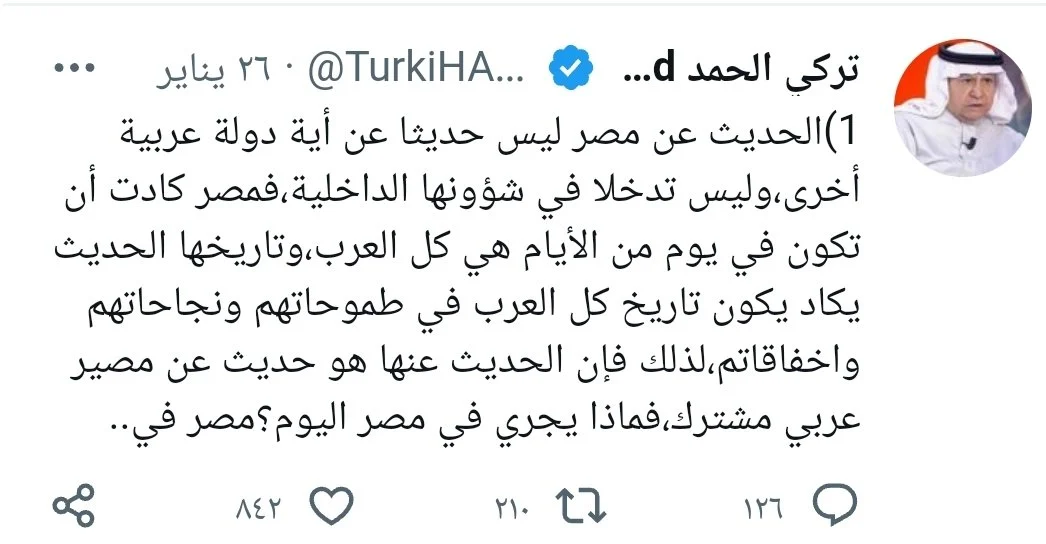
Al-Hamad views Egypt as two separate models: "A prosperous Egypt before 1952, and an ambitious Egypt after that date. Observers are divided into supporters and opponents of this or that model. On the other hand, there’s Egypt in its current reality and situation, i.e. the Egypt full of unemployment, economic and political crises, societal dilemmas, and its violent radical fluctuations that do not belong to any model, be it monarchical or republican in origin."
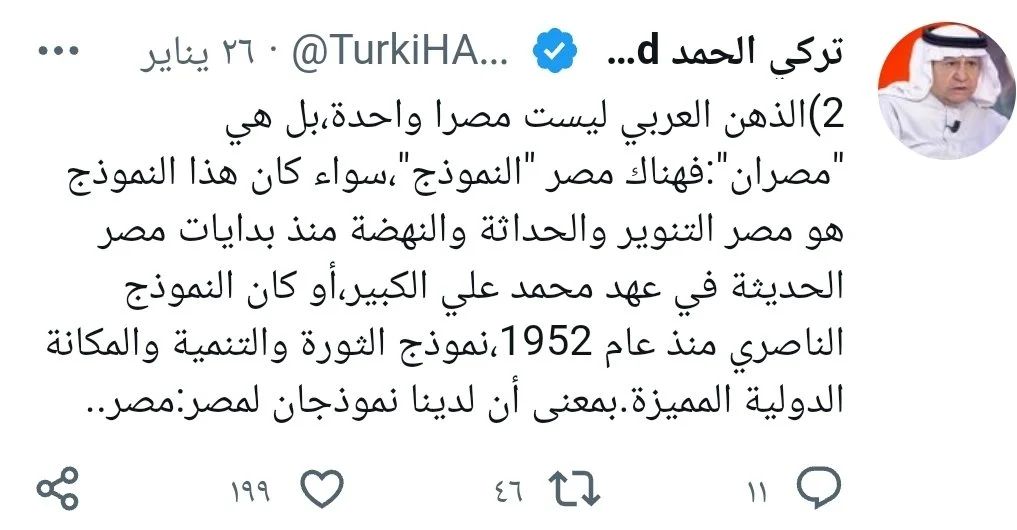
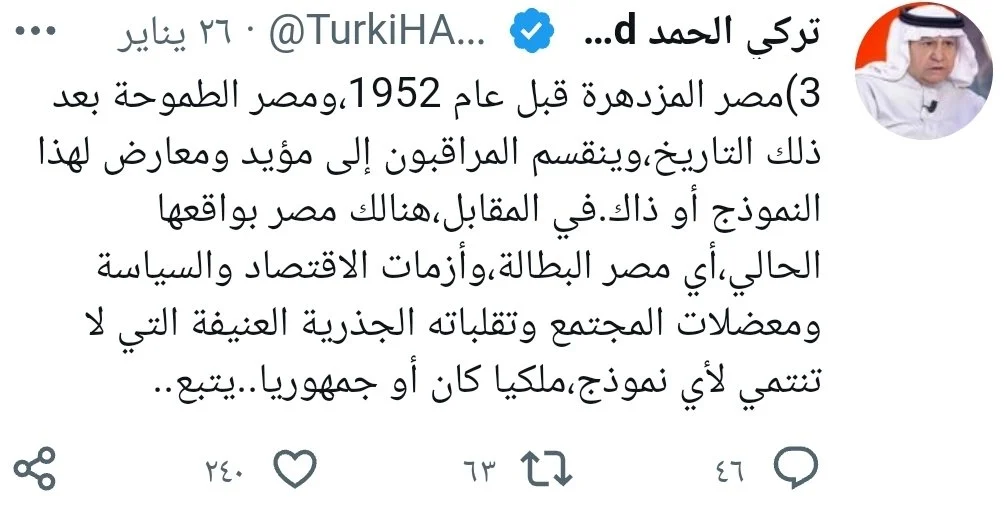
The writer who is close to the Saudi ruling family asks, in what appears to be a message addressed to the Egyptian authority: "What happened to Egypt, which is rich in wealth, potential and capabilities, and which used to lend money and help the needy, and today it is a prisoner of the International Monetary Fund, bending its neck to any help it gets from here or there, even though it is the land of milk and honey? In truth, the Egyptian situation cannot be explained by one factor, especially after the fall of the monarchy and the beginnings of (its progression towards the abyss)."
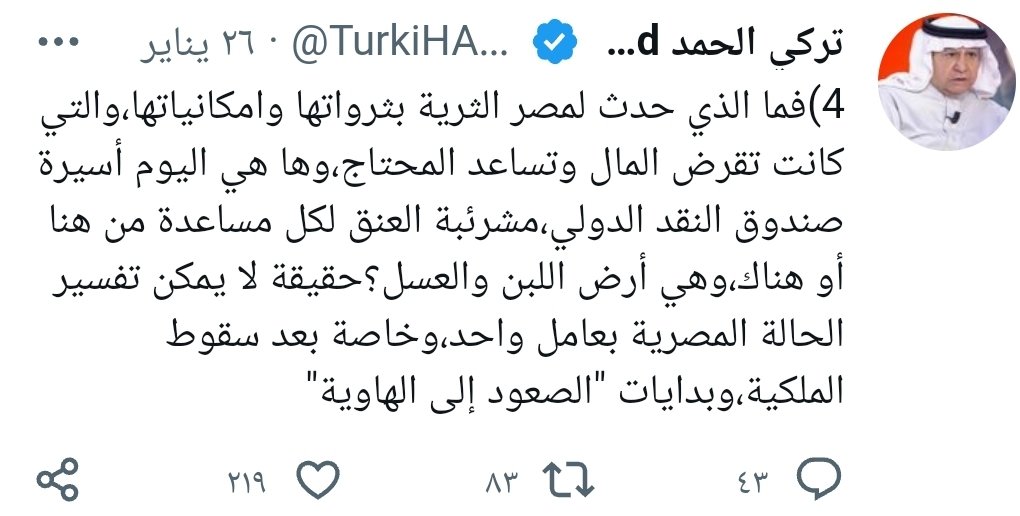
The Kingdom is looking to expand its influence inside Egypt through direct investments and other acquisitions of state assets and properties. However, Egyptian reservations about the nature of these acquisitions have fueled disputes and disagreements between the authorities of the two countries.
Turki al-Hamad criticizes "the army's escalating dominance over the state, especially the economy, as nothing passes in the Egyptian state except through the army, under the supervision of the army, through institutions subject to the army, and in favor of influential people in the army, with some observers seeing this the sources and roots of the crisis, all at the expense of other institutions of society, whether we are talking about the private sector, or civil society institutions, which was at its strongest in the monarchy era," as he put it.
He also touches on what he described as "the aging Egyptian bureaucracy that is resistant to change," which he sees as a stumbling block to any successful economic investment, whether internal or external, "despite the fact that Egypt is an inexhaustible treasure trove of investment opportunities."
The Saudi writer denounces what he called "the popular culture that surrenders, resigns, and awaits everything that comes from (above), whether this above is the sky and its surprises and its heroes emerging from the unknown, or the state with all its majesty and its pharaoh, (the wielder) of the keys to change and the treasure vaults of (Mann-o-Salwa), with the almost complete absence of a sense of independent community initiative.”
A month ago, the adviser to the Saudi Presidency of State Security launched an attack on the Egyptian authority, describing it as one that "begs for its daily sustenance at the doors of the world’s countries," adding, "Let’s thank God that we’re not like Egypt"
Such harsh criticisms from the Saudi writer were not new, as he had earlier launched a wide attack on Egyptian journalist Emad El Din Adib, considering his article "Egypt: Who will compensate for the painful bill of the Russian-Ukrainian war?", as an Egyptian attempt to blackmail the Gulf countries to obtain more financial support, under the pretext of protecting them from the infiltration of Iranian-Turkish influence. He saw that Adib's words "carries an insult to Egypt itself" when he makes it look for a Gulf, Iranian, or Turkish sponsor. He then goes on to question: "Why can't his country solve its chronic crises on its own instead of becoming a burden on this and that?"
كان المفروض على هذا الكاتب أن يتساءل:ولماذا لا تستطيع بلاده (مصر) حل أزماتها المزمنة بنفسها بدل أن تصبح عالة على هذا وذاك؟وهو حقيقة يهين مصر حين يجعلها تبحث عن "راع" خليجي أو إيراني أو تركي،بدل أن تكون هي الراعية،كما كانت في زمن مضى،إذ لا ينقصها شيء مما لدى تركيا وايران والخليج.. https://t.co/K8uKYhEZ2v
— تركي الحمد T. Hamad (@TurkiHAlhamad1) June 18, 2022
كتابتي عن بلد عربي لا يمكن أن تكون تحاملا ضد هذا البلد. عكس ذلك من نوع بعض الظن لا أساس له. بلد كمصر كبيرة بأهلها وتاريخها ونيلها مكانتها في القلب قد تنافس حجمها التاريخي. ونقد سياسات أي حكومة ليس نقدا للدولة وأهلها بل للسياسات تطلعا للأفضل وحسب. نقد يجب أن يكون متاحا للجميع.
— خالد الدخيل (@kdriyadh) January 29, 2023
Along the same line, the Saudi writer and professor of political sociology Khalid al-Dakhil believes that what is happening to Egypt in recent years is due in its first root to the fact that "it has not left the mantle of the military since 1952," criticizing what he described as "the army's failure to allow any other alternative to compete with it over politics or the economy". He also stresses that "criticizing the policies of any government is not a criticism of the state and its people, but rather of policies only in the hopes of becoming better, which should be available to all."
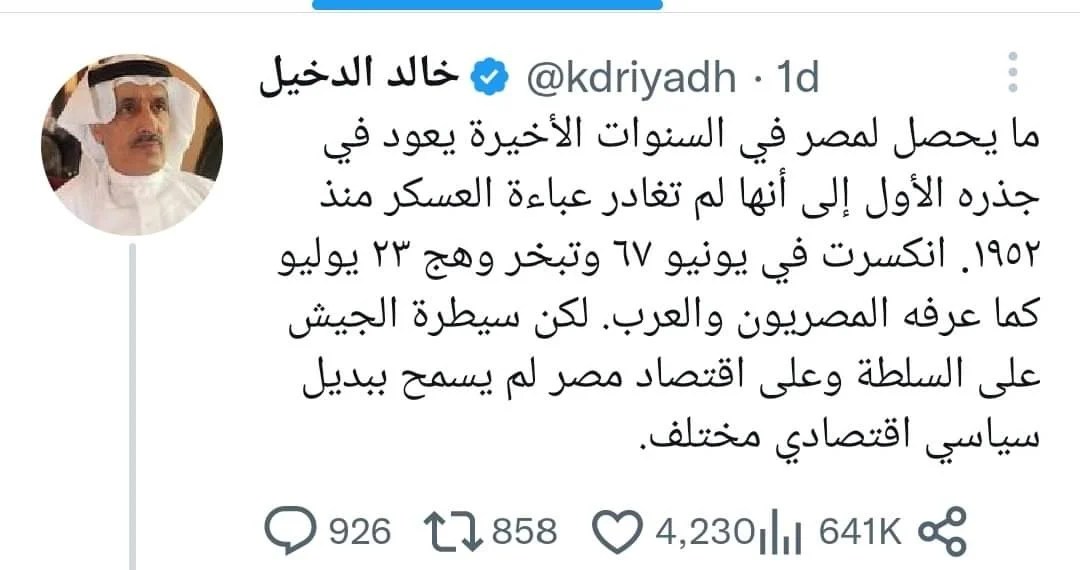
Saudi Finance Minister Mohammed al-Jadaan, in turn, sent a veiled message to the Egyptian authority, on the sidelines of the Davos Forum, which was held on January 18, revealing that his country is reviewing its method of providing aid and grants to neighboring countries, stressing that this aid will be "conditional on reforms", and adding, "We are taxing our people. We want to help other countries, but we also want everyone to do their part."
فيديو | وزير المالية محمد الجدعان في #دافوس:
— قناة الإخبارية (@alekhbariyatv) January 18, 2023
سنغير طريقتنا في منح الودائع والمساعدات التي كنا نعطيها في السابق دون أي شروط#الإخبارية pic.twitter.com/T2wpnrAy6g
Over a month ago, Major General Bassam Atiyyah, an adviser to the Saudi Presidency of State Security who is close to Saudi Crown Prince Mohammed bin Salman, during his participation in a symposium in the Qassim region, launched an attack on the Egyptian authority, describing it as one that "begs for its daily sustenance at the doors of the world’s countries," adding, "Let’s thank God that we’re not like Egypt", while considering the Kingdom to be one of the most prominent international decision-makers.
With the worsening economic crises in Egypt, and the government resorting anew to floating the local currency, which in turn raised prices to record levels, Egyptian journalist Amr Adeeb, who is close to bin Salman's right arm and head of the Saudi Entertainment Authority Turki al-Sheikh, criticized – through his program "Al-Hekaya" on the Saudi MBC channel – the conditions of the Egyptian economy. He stressed that the high prices led to the madness of citizens, which prompted some of them to refrain from buying poultry and eggs, while expecting “the coming to be worse”.
Adeeb's statements made him the target of criticism from media figures close to the Egyptian authority, as Mohammed El Baz, chairman of the board of directors of the newspaper "Al-Dustour" – owned by the "United Media Services" company, which belongs to a high-ranking security agency – launched a sharp attack on Adeeb, describing him as "an agent of the Saudi sponsor", and that he is a tool for the Kingdom to implement its agenda in the region.
An insatiable Gulf appetite for Egyptian investments
Criticism and counter-criticism from officials and media figures affiliated with the authorities of the two countries cannot be seen as mere "views" or an honest commentary on the economic, political and social conditions in Egypt, as they appear in their content as a green light from the two regimes to use this debate as a means of pressure to express hidden differences in a number of thorny files between the two allies, which may carry on for a long time if these problems are not resolved.
The current debate was preceded by other signs, foremost of which was the absence of the Saudi crown prince – who is seen by many as the de facto ruler of the Kingdom – from the El Alamein five-party summit hosted by Egypt last August in the presence of Gulf leaders, as well as his absence from the Abu Dhabi summit hosted by the Emirati capital Abu Dhabi on January 18, which was attended by Egyptian President Abdel Fattah al-Sisi.
Saudi Arabia has been one of the most prominent supporters of the current Egyptian authority since the period after 2013, with broad political and economic support amounting to 40 billion dollars, among other Gulf countries that considered their economic and political support for the new Egyptian authority aspiring and enabling it without a competitor to rule the country, as a means to annihilate political Islamist groups, particularly the Muslim Brotherhood. However following the clinical death of the group, the aspirations of the Kingdom and its neighbors in the Gulf emerged to reap the gains of their previous support with investment influence within the joints of the Egyptian economy, in addition to other strategic gains.
The Kingdom entered with force into investment deals to acquire a number of Egyptian companies and assets, amidst a Gulf insatiable appetite that includes the UAE and Qatar to try to expand their investment influence within the country, which prompted Egyptian politicians, including the head of the Reform and Development Party, Mohamed Anwar Sadat, to warn of an unprecedented rise in the chain of asset purchases and Gulf acquisitions of stakes in Egyptian companies, which increased significantly in the recent period, especially in the first half of 2022.
Saudi Arabia's Public Investment Fund (PIF) launched the Saudi Egyptian Industrial Investment Company (SEII) last August to invest in Egypt's infrastructure, real estate, health, agriculture and pharmaceutical sector. Only days after its inception, it announced the acquisition of shares and stakes in four state-listed companies on the Egyptian Stock Exchange worth 1.3 billion USD, according to official data.
Egypt's delay in implementing the final handover of Tiran and Sanafir to Saudi Arabia may also be one of the main reasons for the dispute between Cairo and Riyadh
Last November, the Saudi Egyptian Industrial Investment Company, owned by the Saudi Public Investment Fund, revealed its intention to increase the volume of its investments in Egypt in the coming period, by acquiring a stake in Misr Aluminum Company and increasing its stake in the Egyptian International Pharmaceutical Industries Company (EIPICO).
If the aluminum deal is implemented, the total number of companies in which the Saudi Egyptian Industrial Investment Company owns shares will be six companies: Abu Qir Fertilizers and Chemical Industries (ABUK.CA), Misr Fertilizers Production Company (MOPCO), Alexandria Container and Cargo Trading, E-Finance for Digital and Financial Investments (EFIH), Egyptian International Pharmaceutical Industries (EIPICO), and B-Tech, which acquired a 34% stake in early October.
In total, Gulf states have allocated $22 billion dollars in investments and financing to Egypt, divided into $5 billion deposited by Saudi Arabia in the Central Bank of Egypt, another $10 billion by the Saudi sovereign fund, $5 billion that Qatar plans to invest in Egypt, and $2 billion from the Abu Dhabi sovereign wealth fund to buy shares in companies listed on the Egyptian Stock Exchange.
Despite the doubling of its investments inside Egypt, it seems that differences over the nature of these investments, as well as other deals, still haven't found their way to a solution, and this may be one of the reasons for the tension between the two countries’s authorities, as there are still Egyptian reservations about Saudi Arabia's investment plan in Egypt, which the Kingdom may see as "guardianship" of its agenda.
Tiran and Sanafir: A bargaining chip and settlement card
The Egyptian delay in implementing the final handover of the strategic Red Sea islands of Tiran and Sanafir to Saudi Arabia may also be one of the main reasons for the dispute between Cairo and Riyadh, as the American site Axios quoted Israeli officials as saying that Egypt has expressed “reservations, mostly of a technical nature,” about the US-led multinational peacekeeping force, which has been in Tiran for years, and which should have left by the end of December 2022, as well as “over the installation of cameras on the islands that were part of the agreement, and are supposed to monitor activity on the islands of Tiran and Sanafir, as well as in the Strait of Tiran.”
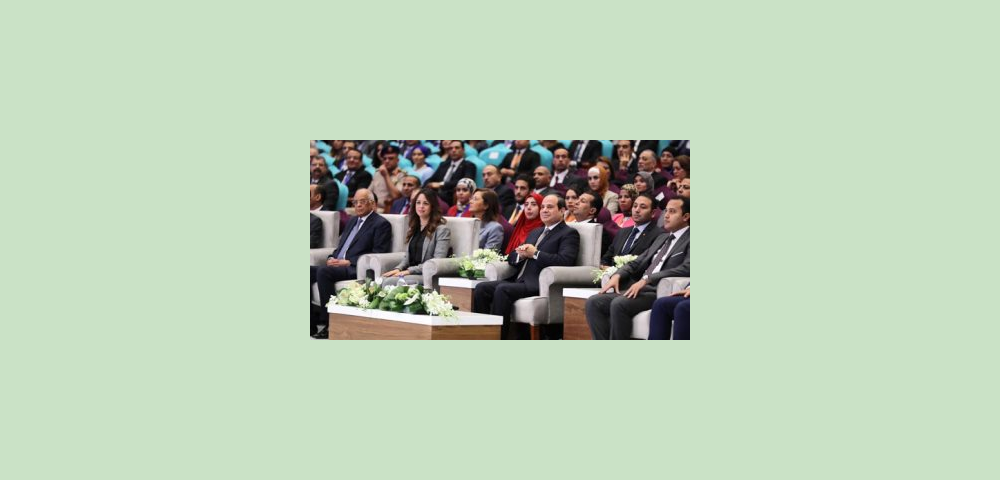
Influential Israeli officials in Israel's intelligence services said they believed Egypt was holding up the deal due to U.S.-Egypt bilateral issues, including American military assistance, which the Biden administration has twice frozen 10% of its annual allocation, amounting to about $1.3 billion, due to U.S. "concerns" about the human rights situation inside the country.
However, this proposal seems to have not been accepted by Saudi officials, who are still waiting for the Egyptian authorities to implement their commitments to them since the conclusion of the maritime border agreement between the two countries in 2018, while they believe that Cairo is still using the issue as a "bargaining chip" within the framework of political and economic settlements.
Cairo – Abu Dhabi: Partnerships and conflicting priorities
On the other hand, while Egypt and the UAE celebrated the 50th anniversary of their strategic relationship, Abu Dhabi seems to have the upper hand in Egyptian decision-making to some extent, topping the list of countries that acquire Egyptian assets, and is the largest investor in the country with a value of $ 6.200 billion, and more than 1,250 Emirati companies operate in Egypt with a capital approaching $20 billion dollars.
The UAE concluded about 20 deals to acquire Egyptian assets in 2021, an increase of 67% over the previous year, worth nearly two billion dollars, most of which are in profitable companies within vital sectors, which still raises growing concern about the nature of these investments, especially with the hidden struggle between the two countries, alongside Saudi Arabia and Qatar, over the role of the most influential player in the region.
Despite the Gulf state's unparalleled support for Egypt since Sisi took power in 2013, Abu Dhabi has used this support as a common ideology to use Cairo as a bulwark to topple political Islamist groups and curb Iranian influence in the region.
Despite this, the two countries have pursued different foreign policy goals at multiple points in the past decade, and at times, they have had conflicting agendas, when Cairo refused to send troops to support the Gulf coalition in Yemen in 2015, and Egypt continued to support Syrian President Bashar al-Assad, despite opposition from some Gulf Arab states to his rule, and its support for other factions. Cairo also decided not to publicly support the overthrow of Sudanese President Omar al-Bashir in 2018, until it became a reality, despite early Gulf efforts to oust him from power.
Despite the heated dispute between Cairo and Addis Ababa, Riyadh and Abu Dhabi raced to support Ethiopia financially, gaining their shares in sectors related to the “Al-Nahda” Renaissance Dam project
The Renaissance Dam: Interests before allies
The differences between Cairo, Abu Dhabi, and Riyadh have also extended to issues of vital importance to Egypt, including those in Libya and the Horn of Africa, where Saudi Arabia has a military base in Djibouti, while another Emirati base is stationed in the Eritrean port of Assab, a region critical to Egypt's strategic and water security.
There is a rising anger that Cairo continues to keep silent over regarding the UAE's and Saudi Arabia's support for Ethiopia, as Egypt's two strategic allies are the Gulf states most invested in Addis Ababa itself. Despite the heated dispute between Cairo and Addis Ababa, Riyadh and Abu Dhabi raced to support Ethiopia financially to gain their shares in sectors related to the “Al-Nahda” Renaissance Dam project (GERD).
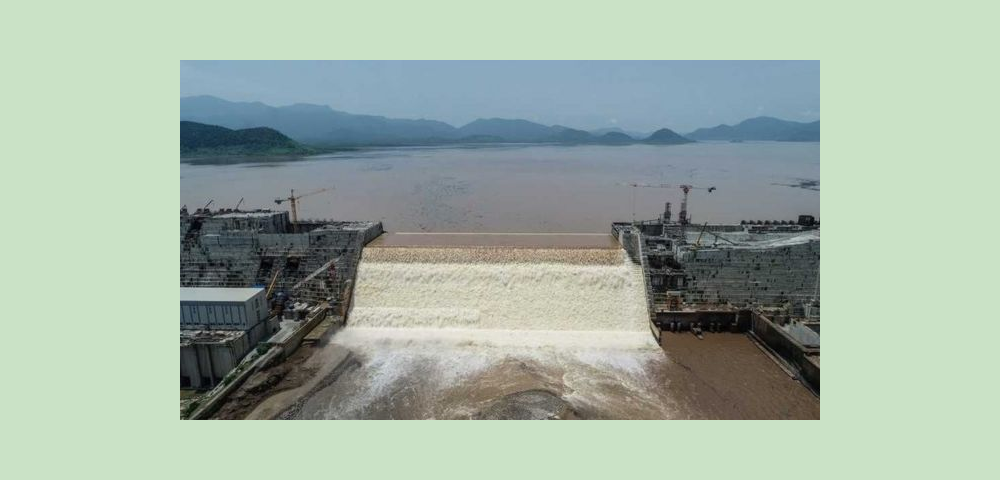
Saudi Arabia is the third largest foreign investor in Ethiopia with about 294 projects, with investments estimated at six billion dollars, most notably in the fields of agriculture and animal production. The Saudi-Ethiopian businessman Mohammed al-Amoudi is one of the most prominent financiers of the “Al-Nahda” Renaissance Dam, while the Kingdom provided millions of dollars of aid to Addis Ababa to complete the project. It announced it would grant Ethiopia two loans worth $140 million dollars to finance projects for "infrastructure and energy".
The UAE-Ethiopian Business Advisory Council, under the supervision of the UAE Embassy in Addis Ababa, in turn announced a plan worth billions of dollars in investment projects in Ethiopia in the fields of agriculture, animal production, and energy as well. Abu Dhabi also pledged to pump three billion dollars into the Ethiopian local economy, and Emirati companies acquired about 40 million feddans (acres) in Ethiopia under the pretext of securing their food needs.
In addition to the recent normalization deals with Israel, the impact of which Egypt is still feeling on its historical role in the region, as Abu Dhabi exploited it to expand its influence in the region and beyond, especially inside the occupied territories, on the grounds that Egypt is no longer the only Arab negotiator with Israel as it has been in the past, following the expansion of the base of Arab countries that have normalized relations with Tel Aviv.
Egyptian playing cards on the table
While Riyadh and Abu Dhabi exploit their economic and political cards in the game of hegemony over decision-making in the region, Cairo also still possesses the means to make maneuvers in order to maintain an important position within regional decision-making circles, especially its vital position in the Arab and African region, as well as the Syrian, Libyan and Sudanese files, and those within the African continent. It also has playing cards it can use in the file of handing over the islands of Tiran and Sanafir to Saudi Arabia, as well as its negotiating weight to end the conflicts between the Israelis and the Palestinians, which the UAE did not have a similar influence on despite the normalization deal, in addition to the Mediterranean gas and migrant files that the West views with great importance, despite the fact that the ability to use these cards has clearly declined.
The competition and rivalry between the three allies may last longer than what some people think, especially as the "unresolved" differences continue, until their political, media, and economic arms receive the red light to stop firing "criticism" once understandings are reached that may restore relations to the point of truce, but will certainly not return to the way they were once before.
Raseef22 is a not for profit entity. Our focus is on quality journalism. Every contribution to the NasRaseef membership goes directly towards journalism production. We stand independent, not accepting corporate sponsorships, sponsored content or political funding.
Support our mission to keep Raseef22 available to all readers by clicking here!
Interested in writing with us? Check our pitch process here!
